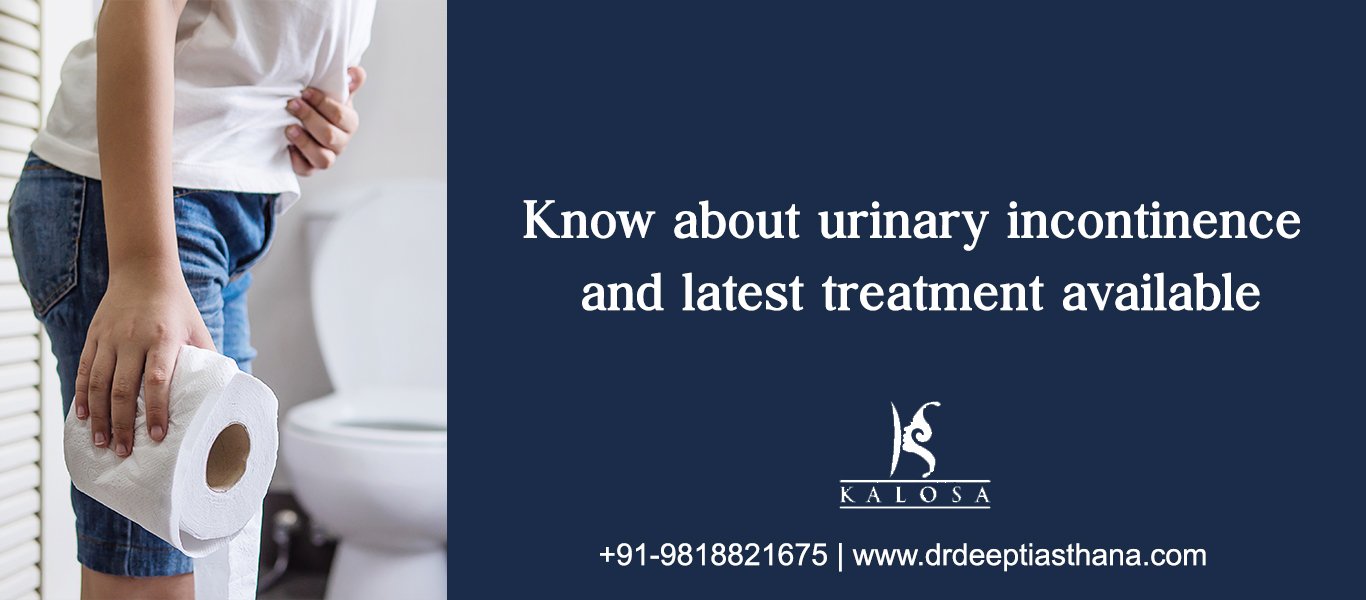
Know about Urinary Incontinence and the Latest Treatment Available
Posted By Dr. Deepti Asthana on 20-01-2021
Urinary incontinence (UI) affects millions of people across the world, irrespective of age or gender. It is a condition when you’re unable to control your bladder, leading to accidental leakage. Despite being a common condition affecting many, UI's prevalence is often considered embarrassing. Some people are even unaware of its occurrence.
Living with UI can be an isolating experience, but it is essential to discuss with your healthcare professionals and understand the solutions.
Table of Contents
Feel free to skip ahead if one topic catches your eye:
- What is urinary incontinence?
- How urinary incontinence affects you?
- Common Causes of urinary incontinence
- When to see a doctor?
- Treatment Options
1. What is urinary incontinence?
Urinary incontinence is the term given to an involuntary passing of urine from the bladder. The condition can affect anybody and may vary in severity from small leaks to complete loss of bladder control.
Highlighted below are some of the key types of UI:
Stress incontinence – This condition is caused by stress on the bladder because of certain physical activities such as exercise, laughing or coughing.
Urge incontinence or Overactive bladder – This is related to leaking out when you have the sudden urge to urinate before reaching for a toilet.
Functional continence – Arthritis or Alzheimer's patients suffer from urine leakage before reaching the toilet as they cannot reach the toilet on time due to physical dysfunction.
Mixed incontinence – Some people suffer from symptoms of stress and urge incontinence
Overflow incontinence – This is when you are not able to completely empty the bladder leading to leakage later.
2. How urinary incontinence affects you?
When it comes to incontinence, each individual suffers from different symptoms and experiences signs.
Urinary incontinence can impact people in the following ways:
- Intense urge to go to the toilet
Contraction of bladder muscles resulting in sudden and intense urge, followed by the involuntary loss of urine.
The wetness of the skin can cause rashes, infections, or soreness. Urinary tract infections are also common side effects.
- Psychological impact:
Social isolation
Feeling of rejection
Loss of control
Problems about body image
It also affects quality of life, quality of sexual life, psychological distress. - Monetary Impact :
Adult diapers are more expensive than newborn diapers, hence there is lot of money spent on
3. Common Causes of urinary incontinence
UI has been affecting individuals for many reasons ranging from age to health conditions.
Some of the key reasons are given below:
- Pregnancy and childbirth affects the bladder system and may result in UI. Birthing more than one baby also puts a woman more at risk.
- due to menopause and old age, there is loss of estrogen in body and this leads to gradual atrophy of tissues. pelvic floor becomes weak, hence not able to hold bladder properly , leading to urine leakage problem.
- In older men, the prostate gland enlarges and adds pressure on the bladder.
- Prostate cancer surgery disrupts the bladder’s ability to hold urine when needed.Removal of prostate or radiation therapy may also affect bladder functioning.
Other reasons are:
Side effects of certain medications
Changes in nerves or muscles of bladder
Medical conditions like Parkinson’s
Intake of excessive caffeine or alcohol
Urinary tract infection
4. When to see a doctor?
People often live with the symptoms, as they feel embarrassed seeking help. If you are experiencing symptoms of UI and it is affecting the quality of your life, it is time to consult the doctor.
Your doctor will diagnose the abnormalities, medical conditions, or reasons behind your suffering, and provide you an efficient treatment. Discuss with your doctor about the following things:
Your doctor will run tests such as urine sample tests, vaginal, rectal examinations, imaging scans for the bladder, etc. On the basis of the findings, you will be given helpful advice and the right treatment.

5. Treatment Options
he treatment options will depend on the symptoms, type of incontinence you are suffering, underlying causes, and severity of your condition.
- Medications: The most commonly used medications to treat incontinence includes:
Mirabegron: Used to relax bladder muscles to treat intense urinary urge.
Anticholinergics: For soothing bladder and treating severe urge incontinence - Alpha-blockers: For relaxing muscles of the bladder and making emptying the bladder easy
- Pelvic floor training or Kegel exercises: For strengthening pelvic muscles.
- Delayed voiding therapy: Self-management therapy that involves setting a schedule for urination, handling the urge of feeling, and training for delaying urination.
- Botox injections: Botox injections for the bladder are also found effective in many cases
- Your physician may also suggest behavioral therapy or lifestyle alterations such as:
Balancing drinking intake
Managing a healthy BMI
Dietary changes include avoiding dairy products, fatty foods, fried foods, processed foods, etc. - Surgery: Earlier this used to be the final option for patients of SUI. wherein tapes or slings were put near bladder area for bladder neck support.with the introduction of newer non invasive treatments, this option is becoming less popular.
6. WHAT IS NEW IN TREATMENT OF URINE LEAKAGE?
Welcome to Kalosa Clinic,one of the best Gynecology/Obstetrics clinics in South City-I, Gurgaon, where we offer a revolutionary treatment of urinary incontinence by BTL EMSELLA to treat all your incontinence problem. If you’re suffering from symptoms of incontinence, Kalosa Clinic and BTL Emsella are here to help!
WHAT IS BTL EMSELLA?
BTL Emsella is an innovative, FDA approved treatment to help improve the symptoms of incontinence, including leaking when you laugh, dribbles when lifting heavy objects and losing sleep when waking multiple times during the night for the urination. All of this impacts on your general health and happiness.
It uses revolutionary High-Intensity Focused Electromagnetic (HIFEM) technology to stimulate the pelvic floor muscles and treat stress, urge and mixed incontinence. Using electromagnetic currents to contract the pelvic floor muscles, the BTL Emsella delivers around 11,000 kegel's contractions in 30 minutes and strengthens the muscles so that they can hold the bladder and urethra together tighter, providing control and strength, so you don’t have to worry about those little dribbles when you’re not expecting them!
BTL Emsella is a non-invasive, non-surgical, completely painless treatment, which can be carried out in less than half an hour per session.
What is BTL Emsella treatment like?
BTL Emsella treatment is perhaps the most simple and comfortable vaginal rejuvenation treatment in the medical field. All you have to do during BTL Emsella treatment is sit in the treatment chair for 30 min duration. You might feel a tensing and relaxing sensation throughout the treatment, but this isn’t painful and most patients aren’t bothered by this.
BTL Emsella treatment is carried out fully clothed, and you can comfortably read a book or magazine during your treatment or simply watch television.
How long does BTL Emsella treatment take?
BTL Emsella treatment only takes 28 minutes! We recommend six treatments for 3 weeks - twice per week - for optimum results.
Who cannot use BTL Emsella?
If you are currently pregnant
If you have any metal plates in your body, such as metal hip replacements
If you have a pacemaker
If you have a copper coil or IUD
If you have any intimate piercings, we’ll also ask you to remove these before treatment.
Takeaway
Different patients experience different types of urine incontinence, in varying levels, and require individual treatment options. From behavioral therapies to medications, several kinds of solutions are available to help manage the symptoms for people living with urine incontinence. At KALOSA CLINIC, we are offering you the latest and best non surgical treatment option for urine leakage problem. To know in detail about this best treatment for you, call Kalosa clinic and get in touch with the expert doctor Dr Deepti Asthana.